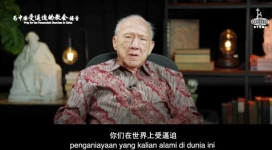Outspoken American conservative Pat Buchanan has written a new column arguing that the modern culture wars in the United States have now taken aim at Christian men important to U.S. history.
The column, which was published in Townhall on Tuesday, argued that war has been declared against Christian men who played important roles in U.S. history. Buchanan cited the example of Saint Louis University, which removed a "heroic-sized" statue of Fr. Pierre-Jean De Smet S.J. from its place at Fusz Hall after 60 years; it showed the friar holding a crucifix as he ministers to two Native Americans.
"Historically, the statue is accurate," Buchanan wrote. "Fr. De Smet, 'Blackrobe,' as he was known, was a 19th-century missionary to Indian tribes who converted thousands. A friend of Sitting Bull, he spent his last years in St. Louis."

However, Clayton Berry, Saint Louis University Assistant Vice President for Communications, indicated that questions have been raised on "whether the sculpture is culturally sensitive." Ryan McKinley, a senior at the university, had a more specific explanation.
"The statue of De Smet depicts a history of colonialism, imperialism, racism and of Christian and white supremacy," McKinley said.
Buchanan pointed out that the university's mission was "to instruct the Catholic young in their faith and send them out into the world to bring the good news of Jesus Christ as Lord and savior to nonbelievers."
"If the founder of Christianity is the Son of God, then Christianity is a superior religion," Buchanan wrote. "What Ryan and those faculty and staff seem to be ashamed of, uncomfortable with, or unable to defend, is the truth for which Saint Louis University was supposed to stand."
Buchanan contended that SLU should have defended its statue against the dissenters.
"The message the SLU president should have given the dissenters is simple: We are a Catholic university that welcomes students and faculty not of the faith," Buchanan wrote. "But if you find our identity objectionable, then go somewhere else. We are not changing who we are."

The conservative then turned his focus on Fr. Junipero Serra, a Spanish Franciscan who helped convert thousands of Native Americans to Christianity in California during the 18th century; Pope Francis plans to canonize him. He was also behind the establishment of nine missions, which would eventually lead to the development of San Diego, San Juan Capistrano, Santa Barbara and San Francisco.
"Not only is Fr. Serra's name famous in California, his statue has stood since 1931 in the U.S. Capitol in one of two places set aside for the Golden State," Buchanan wrote. "The other statue representing California is that of President Ronald Reagan, unveiled in 2009, which replaced a statue of the preacher Thomas Starr King."
Buchanan noted that there was a movement to remove Serra's statue because he supposedly "helped eradicate their religion and culture, replacing it with his own." The Republican then turned his fury against feminists who wanted to remove Andrew Jackson from the $20 bill.
"Jackson, it is said, was responsible for the ethnic cleansing of the Cherokees in the Trail of Tears," Buchanan wrote. "Yet, Jackson, slashed across the head by a British soldier in the last days of the Revolution for refusing to polish his boots, was also arguably the greatest soldier-statesman in American history. Gen. Jackson led the 1815 defense of New Orleans against the British invasion force, and crushed the Indian marauders in Florida, drove out the Spanish governor, and cleared the path for annexation."
According to Buchanan, one Internet poll indicated that Jackson could be replaced by one of the following four women: Eleanor Roosevelt, Rosa Parks, Wilma Mankiller and Harriet Tubman. He argued that the "affirmative action business" has gone too far this time.
"Twice elected president, Jackson is, with Jefferson, a father of the Democratic Party, and he and his proteges Sam Houston and James K. Polk virtually doubled the size of the United States," Buchanan wrote.
Buchanan concluded that these issues were part of a "deep divide" that Americans have struggled to answer and resolve in terms of history.
"Was the European Christian conquest of America, given its flaws and failings, on balance, a great and good thing, or not?" Buchanan asked.







